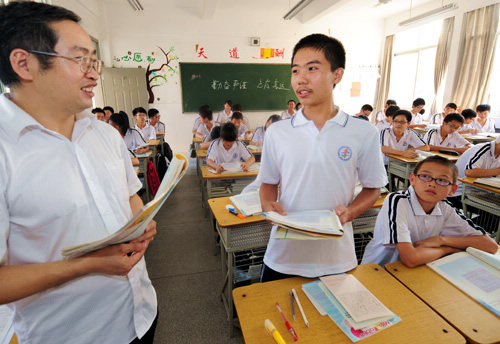|
 |
|
INCLUSIVE EDUCATION: Tian Wei, a student at No.1 Middle School in Jinjiang, Fujian Province, whose parents are migrant workers from Chongqing, answers questions during class on September 5, 2012 (ZHANG GUOJUN) |
According to Guangdong's policies, children of non-permanent residents will be able to sit the local gaokao from 2016 on the condition that they have studied three years in a high school in the city where their parents work, and that their parents have had stable jobs, fixed residences and a local social insurance account for more than three years.
Restrictions would be relaxed "step by step" as the province must solve the conflict between its gigantic migrant population and a scarcity of educational resources, Luo Weiqi, head of the province's Department of Education, told Xinhua News Agency.
Unlike Beijing and Shanghai whose college admission rates are among the highest in China, Guangdong, a densely populated province that has the largest migrant population in the country, has lower than average admission rates.
Advancing urbanization by ensuring equal access to public services for newcomers is high on the country's development agenda. The report to the 18th National Congress of the ruling Communist Party of China pledged to ensure that children of rural migrant workers in cities have equal access to education.
However, some local hukou holders in large cities oppose such reforms for fear that the flood of students relocated for the purpose of advancing their chances of entering a prestigious university would strain already crowded public schools.
It is estimated that primary school applicants in Beijing would soar from 100,000 in 2012 to 180,000 in 2014, bringing the total number of the city's primary school students from the current 680,000 to 840,000.
Xiong Bingqi, Vice President of the Beijing-based 21st Century Education Research Institute, said that local governments should not be entrusted with the task of reforming the current gaokao system.
"Under the current design, opening up local gaokao seats to migrant workers' children would hurt the interests of exam takers with local hukou. It is only natural that local governments would set the bar high to protect local hukou holders' interests when they are given the power by the Central Government," Xiong said. The long-term observer of China's gaokao reforms believed that the key to solving the problem lies in a more thorough reform.
"The gaokao should be transformed in accordance with the National Plan for Medium- and Long-Term Education Reform and Development that came out in 2010 to give universities the autonomy to choose students and students the freedom of choice. If all prestigious universities can select students on merit, we would not even need special policies for migrant workers' children," Xiong told China Radio International.
Email us at: lili@bjreview.com | 